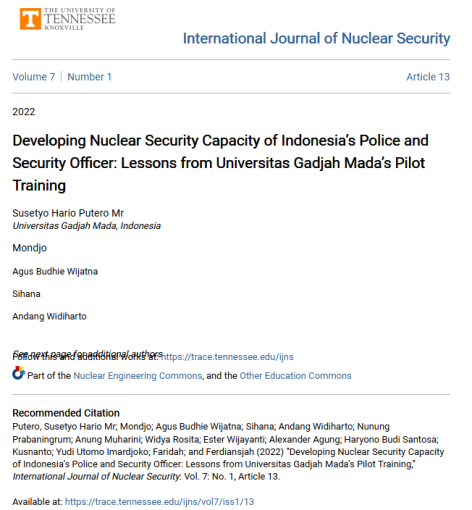
Ir. Susetyo Hario Putero, M.Eng. and UGM’s Nuclear Engineering Program team successfully disseminated their nuclear security pilot training program at the International Journal of Nuclear Security with the title “Developing Nuclear Security Capacity of Indonesia’s Police and Security Officer: Lessons from Universitas Gadjah Mada’s Pilot Training,” published in 2022.
Nuclear security issues such as terrorism and radioactive source theft continue to be a concern in Indonesia. For example, in early 2020, an orphan radioactive source was discovered from the theft of used radioactive sources. According to International Atomic Energy Agency’s Incident and Trafficking Database, most thefts reported involved used radioactive sources in industrial or medical applications. According to data provided by the Nuclear Energy Regulatory Agency of Indonesia (BAPETEN), there are 13294 licenses released for using ionizing radiation sources spread across 3695 industrial and medical facilities. However, the radiation sources in these facilities are not protected appropriately due to the lack of nuclear security knowledge in Indonesian police and security forces. This lack of nuclear security knowledge makes a training program necessary to help police and security forces secure civilian facilities that utilize radioactive sources.

The paper shares the Nuclear Engineering Program’s experience while conducting the pilot three-day training for local police and UGM’s security officers in the Special Region of Yogyakarta (DIY). The lessons were divided into 12 sessions, shown in Table 1. Sessions 1,2, and 3 were intended to briefly explain the foundation of nuclear technology, and the rest provided the basic skills of nuclear security.
The study comprised 16 police officers and four UGM officers, and the security training was conducted on September 3-5, 2018. The police officers came from medical, forensic, special corps, and criminal investigation divisions. The nuclear security training was a new experience for most of the officers. Trainees looked excited when they learned how to use a Personal Radiation Detector (PRD), a Radionuclide Identification Detector (RID), and a survey meter. The trainees practiced finding hidden radioactive sources in an exercise, as shown in Figure-1. The trainees were also asked to build physical protection in a hypothetical radioactive unit from the perspective of an attack ground and a security group.

Figure-1. A trainee exercises finding hidden radiation sources using PRD, RID, and a survey meter.
Pre-tests and post-tests were conducted to analyze trainee knowledge of the materials before and after the training. Based on these tests, the team concluded that the trainees’ knowledge of nuclear security has improved. Further training with a larger number of participants will be beneficial to further improve awareness of nuclear security measures across Indonesia.
For more Information and collaboration, please contact:
Ir. Susetyo Hario Putero, M.Eng.
Department of Nuclear Engineering and Engineering Physics, Universitas Gadjah Mada
Jl. Grafika No.2, Sinduadi, Mlati, Sleman, Daerah Istimewa Yogyakarta, 55281
Indonesia
email: susetyo@ugm.ac.id
Reference
Putero, Susetyo Hario Mr; Mondjo; Agus Budhie Wijatna; Sihana; Andang Widiharto; Nunung
Prabaningrum; Anung Muharini; Widya Rosita; Ester Wijayanti; Alexander Agung; Haryono Budi Santosa;
Kusnanto; Yudi Utomo Imardjoko; Faridah; and Ferdiansjah (2022) “Developing Nuclear Security Capacity
of Indonesia’s Police and Security Officer: Lessons from Universitas Gadjah Mada’s Pilot Training,”
International Journal of Nuclear Security: Vol. 7: No. 1, Article 13.
Available at: https://trace.tennessee.edu/ijns/vol7/iss1/13



